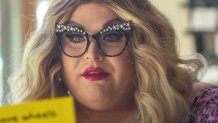
The new short documentary “It’s Okay” explores the experiences of two young brothers at a Drag Story Hour event in North Carolina, one of more than a dozen states that have considered restrictions on drag performances in front of minors in recent years.
“It’s Okay,” a partnership between MSNBC and The New Yorker Documentary, follows Leo, 9, and Matteo, 4, as they play “Shelita Says” — a version of “Simon Says” — with local drag performer Shelita Bonet Hoyle in Charlotte and watch her read “The Family Book.” The 11-minute documentary will premiere Sunday at 9:45 p.m. ET on MSNBC.
Watch NBC6 free wherever you are
>David France, the Oscar-nominated director of “How to Survive a Plague,” said he decided to take on the project after witnessing a protest outside of a Drag Story Hour in Queens, New York, in late 2022.

Get local news you need to know to start your day with NBC 6's News Headlines newsletter.
>“I was shocked by the vitriol and the hatred and the presence of Proud Boys in uniform and avowed Nazis who were there to denounce drag queens, gay people in general, and Drag Story Hour as an organization of ‘groomers,’ in their words, and ‘pedophiles,’” France told NBC News. “And it seemed shocking to me that people would think that.”France said that he, like many of the protesters, realized he had never been inside a Drag Story Hour, a national program in which drag performers read children’s books to kids, and then he watched as states began to pass restrictions on drag. Two states, Montana and Tennessee, have restricted drag performances in front of minors, though a federal judge blocked Montana’s law from taking effect last year. A federal appeals court allowed Tennessee’s law to take effect last month, reversing a lower court ruling that found it unconstitutional.
An additional four states passed laws that could be used to restrict drag, according to the Movement Advancement Project, an LGBTQ think tank.
Proponents of the laws have pointed to an increase in viral videos shared on social media that show children at drag performances, which they argue are sexually explicit.
U.S. & World
GLAAD, a national LGBTQ media advocacy organization, found that drag events faced more than 160 protests and significant threats between early 2022 and April 2023, with some events targeted by armed protesters.
France said he felt like the people who were left out of the national conversation about Drag Story Hour were the kids who attended them. As a result, he wanted to record a child’s experience at one of the events, and he knew tensions surrounding drag events were particularly high in North Carolina, which had 10 drag events targeted by protests and threats, the second highest number in the country behind Texas, which had 20, according to GLAAD’s report.
“We really wanted to know the kids’ experience, really absent everything else,” France said. “We didn’t want to interview them. We didn’t want to get their analysis of what happened. We wanted to be embedded with them intimately enough that we could experience their journey through the reading in the way that they were experiencing it.”

France said the team behind “It’s Okay” built special camera mounts so they could film very low, and they spent a few days with Leo and Matteo’s family with the camera so that they would become accustomed to it. They also created a “microphone vest” for Leo that recorded his heartbeat and breathing patterns, some of which can be heard in the film.
“We wanted to hear and feel his discomfort if he had it, his joy if he had it, his curiosity,” France said. “We really invested deeply in his experience, and I think he showed us all of that, and he did it in a real, genuine way.”
France said his team initially thought it was just following Leo’s experience, but then his little brother, Matteo, “had such a distinct reaction” to the performer, Shelita.
“He was thrilled in the way only kids can be,” France said. “He was blown away by this enormous drag queen as she comes into the room and wearing her rhinestones and her big glasses and her enormous wig, and we knew immediately that we had to capture both of their responses.”
France said they also recorded audio from 21 different points in the room where the Drag Story Hour took place, because they wanted to pick up more delicate noises throughout the reading.
“It did feel like a kind of a sacred space, in part because it is so contested,” France said of making the film. “The storms around gender and gender identity and drag and queerness in general are still mounting. I wanted to address that in some way, but not through counterargument. I wanted to address it through this intimate journalism. If Leo had rejected the reading, that would be our film. If his brother was indifferent to the drag queen or the story, that would have been our film. In the end, I hope that it has a kind of a neutrality to it that can engage in those arguments in a productive way.”
For more from NBC Out, sign up for our weekly newsletter.
This story first appeared on NBCNews.com. More from NBC News:



